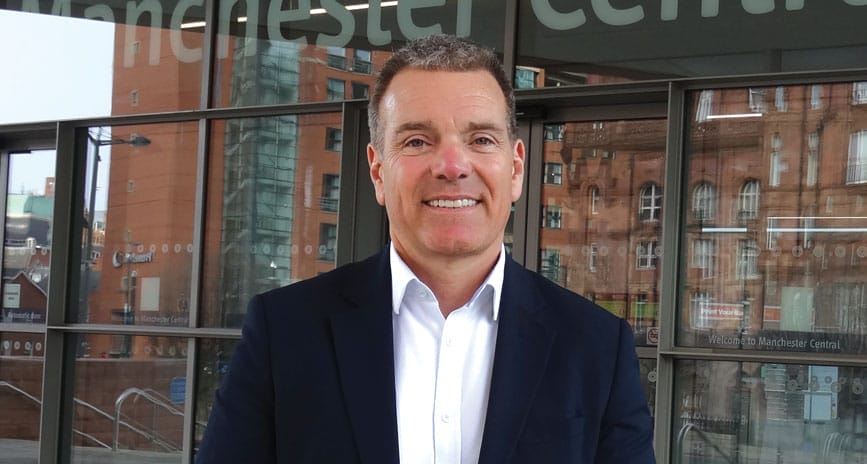The end of October saw a pro-manchester organised Green Tech Symposium take place at Squire Patton Boggs in Spinningfields. The event featured leaders in our region’s Green Tech sector who presented to a packed audience enjoying a unique overview of businesses disrupting the green sector. The event was covered by GM Business Connect and the following feature was written by Mel Hill, Communications Manager from pro-manchester:
Vijay Natarajan is Founder of QBots, a company aiming to reduce our energy bills by utilising local energy sources. “There is no incentive for your energy supplier to reduce your bills,” says Vijay. “We are looking at bringing together commercial buildings using smart technology to integrate locally. One thing that’s shocked us is that, on average, 41% of your energy bill is the cost of energy. The rest is profit and tax imposed by the government.”
“Science doesn’t work by itself,” says Amer Gaffar, Director – Manchester Fuel Cell Innovation. “At MMU we have a great business facility, where we have PHD students looking at future prices of fuel cell energy and repercussions of when the government inevitably taxes this form of energy too. This collaboration is key to de-carbonising in our city. As a university we have great communication between departments. In a booming city like Manchester, where we as businesses collectively have a massive target to be carbon neutral by 2038, I believe this is how we’ll get there.” As Mayor Andy Burnham continues to push his desire for Greater Manchester to be the UK’s first carbon-neutral region by 2038 – 12 years ahead of the rest of the UK, MMU has spent £2.5m on equipment which looks at analytical properties of a fuel cell. Together, they are working with TfGM and GMCA to create a strategy that meet’s the Mayor’s target. Our Transport panel, which discussed whether tech is making our transport greener consisted of Justin Moss – Siemens Mobility; Helen Boyle – Electricity North West; Jim Shaw – Bloom3 and Tracy Barr.
Continuing on from Amer’s fuel cell technology discussion earlier in the day, Justin Moss said: “People are more noticeably looking at fuel cells, hydrogen and battery powered vehicles. It is the main wave helping us with the goal to have low-carbon railways. In the UK 45% of trains are electrified, but the rest of Europe is at 60%, so we are behind.“Contrary to belief, there are no constraints on the network and there is plenty of headroom for more electric vehicles,” said Helen Boyle – Electricity North West. “We work with TfGM and National Rail around electrification. By 2050 it is forecast that demand for electricity is set to double with new technology. There are no challenges for us here, and there is plenty of capacity in the network. We promise, if we connect all the planned electric vehicles set to take to our roads, the lights will not go out! We’ve created headroom in the network for low-carbon transport,” stressed Helen.
Jim Shaw, formerly of Bentley Motors and the BMW Group says the goal for low-carbon footprints doesn’t solely fall to the feet of electric vehicles: “A vision for multi-modal cities are necessary. 2m-4m car sales that seat 4-5 people isn’t enough. We need to look at the wider transport infrastructure that will reduce the number of vehicles on the road. That is when we’ll see real change. A connected infrastructure, with electrified railways that work, are on time and trustworthy will make a huge difference.”
Tracy Barr, former Group Airlines Head of Cabin Quality for Thomas Cook Airlines says: “Sustainability has to be at the heart of the business. At Thomas Cook it was part of the culture – how can we improve this? How can we make it greener? The regulations have set two clear targets; they expect carbon neutral growth by 2020 and a 50% cut on emissions by 2050. Small tweaks and changes make such a huge difference, so businesses need to be focusing and investing in innovation. By creating lighter weight seats and reducing the weight of the refreshment trolleys on board, we saved 300kg of fuel per year, which is an insane amount. These small changes make a massive difference.” Other small changes, such as replacing receipts with e-receipts saved upwards of 400 trees and removing plastic straws and stirrers removed 8m pieces of plastic from the group’s carbon footprint “I think Manchester is in a great place to take the lead on this,” says Jim Shaw. “The city is perfect size for measuring and implementing a carbon-neutral region. It’s a really exciting time for green tech right now and one that Manchester is set to be at the forefront on if businesses continue to collaborate.”
Wardell Armstrong, Manchester-based environmental consultants have been working on an impressive research project that shows some staggering effects that pollution is having on our city. Mark Knight, Associate Director’s keynote delivered some harrowing facts. Pollution is responsible for three million deaths per year, with 5% of these accounting for young adult mortality. “Pollution is humankind’s biggest threat,” says Mark Knight. “It accounts for 40,000 early deaths in Greater Manchester alone and we’re starting to put a plan together to make a drastic change. Diesel and petrol cars are planned to be phased out by 2040, but what can be achieved in the meantime? We have been looking for innovative solutions that combat air pollution, which is cost effective, accessible and can be rolled out immediately.” Possible solutions which have showed strong results thus far include ivy green screens, green and moss walls, green roofs, street trees and evergreen hedges. “Silver birch trees planted by a busy road also reduced pollution levels in nearby houses by more than 50%. Diesel exhaust particles are trapped by the microscopic hairs on the leaves, which rain then washes away – this is the only time rain in Manchester is useful,” joked Mark. “Planting silver birch trees could save 29,000 annual air pollution deaths.”
Next, we covered the incredible work being done by the University of Salford to tackle climate change. Joe Flanagan is Project Manager on the university’s Energy House 2.0 project, funded by the European Regional Development Fund. The £16m development is the world’s first all-weather research centre aimed at developing initiatives to save on energy bills. Incredibly, the Energy House boasts over 400 sensors, with a temperature range of -12 degrees Celsius and +30 degrees Celsius. Joe’s insights were fascinating, showing how sensors can respond to weather changes and react accordingly to keep energy costs and usage down, but ensure people are warm (or cool) among other things in their home. The project is due for completion in Spring 2021. “We have been fully supported by our key partners on both the Energy House and the Energy House 2.0 projects,” explains Joe. “The funding from ERDF as well as the support from local government will be what helps us to make real change to become the zero-carbon region we all want to be, as per Mayor Andy Burnham’s plans,” continued Joe. It’s not just the University of Salford’s project that’s helping with Andy Burnham’s plans to be carbon neutral by 2038; 12 years ahead of the rest of the UK. Amer Gaffar, Director at Manchester Met’s Fuel Cell Innovation Centre says: “This city is booming, and we all have this massive target but how are we going to get there? We can change a lot with some behavioural changes. Science doesn’t work by itself, this is why we have a great business faculty at MMU, who are looking at future prices and even the taxes that the government may inevitably attach to fuel cell energy, as we begin to use less fossil fuels.”
Amer believes the big change will be when large organisations get involved in promoting the use of renewable energy sources: “Manchester City have adopted fuel cell technology and that’s what we need. The whole Etihad complex is utilising the technology we’re creating, and hopefully these organisations will help others to follow suit.”
Our second panel of the day discussed The Business of Green Tech, including Todd Holden – GC Business Growth Hub; Sandra Hill – The Hill Group Limited; Somayeh Taheri – Urban Chain; Mark Westwood – ABGI and Alex Rothwell – Maven Capital. “This [sustainability] is a really fast-moving agenda,” said Todd Holden, Director of Low Carbon at GC Business Growth Hub. “In order to keep your business on track, you need to find someone who is passionate about sustainability, ensure they want to stay, and help them to continuously learn.”
Sandra Hill has recruited in renewable energy and gas for 25 years and has seen a huge shift in this time: “In today’s job market, people look at the capabilities for an individual but more importantly, they look at whether they fit in with a company’s core values. It’s not just the businesses that do this. Millennials want to work for businesses who are taking sustainability seriously and investing in green technologies.” One of the most shocking keynotes of the day came from Sophie Walker, co-founder of Dsposal, a waste disposal start-up, who shared some stats that came as a shock to delegates. “Waste crime costs £1bn a year for the UK economy – that’s £600m in England alone,” explained Sophie. “49% of adults didn’t know a rubbish removal service should be licensed and 48% of SMEs don’t know what happens to their waste when it leaves their premises and they are liable if it’s criminal and tracked back to them. This is because our current system is very paper-based and is highly susceptible to illegal activity. Waste crime been called the new narcotics. Lack of digital systems means it’s easy for criminals to exploit the system with mistreatment of waste.” It is very clear from our Green Tech Symposium that there are some very exciting goings on in this landscape from both established businesses and institutions as well as tech disruptors.
pro-manchester is the largest business development organisation in the Northwest. They represent the business community across the region and support growth and development to promote the North as the place to do business. For more details call 0161 833 0964 or email admin@pro-manchester.co.uk




